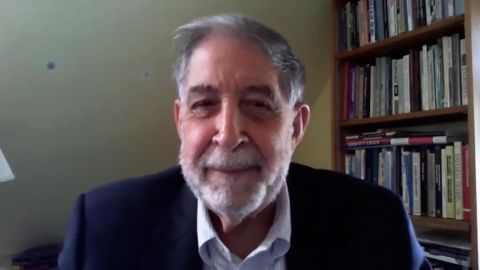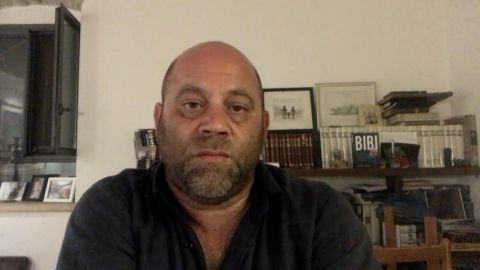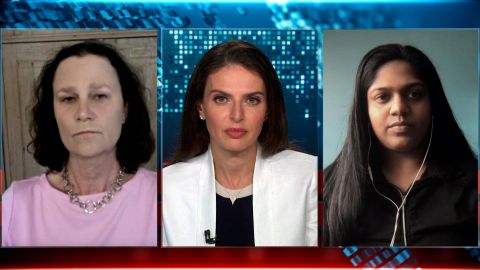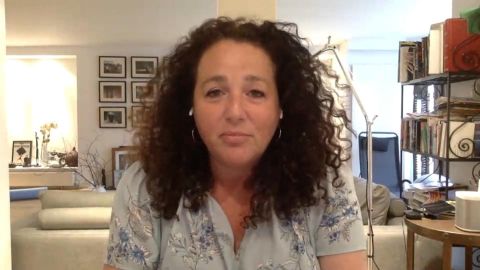Read Transcript EXPAND
BIANNA GOLODRYGA: Well, now we’re going to be turning to U.S. politics and the changing face of the GOP. Lifelong Republican and former Congressman Mickey Edwards
walked away from his party earlier this year, saying that it had become less of a party and more of a cult.
Here he is speaking to our Walter Isaacson about whether they’re fit to run the highest office in America and the myth that the election was stolen.
(BEGIN VIDEO CLIP)
WALTER ISAACSON: Thank you, Bianna. And, Mickey Edwards, welcome to the show.
MICKEY EDWARDS, FORMER U.S. HOUSE REPUBLICAN: Thanks, Walter. Good to see you.
ISAACSON: So many of what were once your fellow Republicans in Congress voted not to look at the January 6th insurrection and even said that they
weren’t willing to certify Trump’s vote. Do you think they really believe that the election was fraudulent?
EDWARDS: Well, I think some of them do, but I think a lot more and I think their voters do because their voters have been — you know, they watch the
newscasts that they watch and they listen to the president, but I think a lot of members of Congress are terrified of being attacked in primaries.
You know that Trump endorses somebody to run against them in their party primary and they lose. And I think fear — to a large extent, Walter, I
think it is cowardness. They will do anything to hold onto these precious offices they hold.
ISAACSON: And explain to me Leader McConnell or Kevin McCarthy in Congress, what is motivating them, do you think?
EDWARDS: You know, part of it is, as you know, I have been critical of the whole party system for a long time, but it is about power. They see that
the House and Senate are both very much in play. The Democrats barely won the two Houses, barely won the presidency, although it was a pretty good
size, but Trump got a lot of votes.
And I think they see that they have to do what they’re doing now to energize their base and win back control in two years, control of Congress
in two years. And I think that’s the only thing that’s motivating them. They don’t care about policies. They care about how they’re going to regain
control.
ISAACSON: You say they’re afraid of being primaried. Is there some structural reform we could do to the primary and party system that would
make the country be balanced once again?
EDWARDS: Well, sure. I mean, you look to California and Washington State, this is something I’d advocated for a long time. As you remove the party
process from the election process and you just have open primaries, anybody of whatever party could run. That’s how Kamala Harris got elected to the
Senate in California, it was Democrats and Republicans all on one ticket rather than party primary, and then the top two people run against each
other. That’s a much better system. It takes away ability of extremes in either party to dictate.
Because under the rules, if you don’t win your party’s nomination now in most states, you can’t run. You know, voters don’t get a chance to consider
you. So, yes, there are — we need structural changes in the system.
ISAACSON: You know Liz Cheney. What do you think of her ouster from Republican leadership?
EDWARDS: It is funny, when they ousted her, they sort of made her a hero because — so, she was the conference chair. Most people who follow
politics, I don’t know, Walter, if you could name who was conference chair before she was —
ISAACSON: You were the conference chair once when you were an Oklahoma congressman. I know that.
EDWARDS: I was chairman of the policy committee. But, you know, is — you know, people don’t know who that is. And they elevated her prestige quite a
bit by getting rid of her. But it does say something that there’s no tolerance for the sin. That as in any cult, what happens now, in this case,
it was in the House, you toe the line.
You do — you’re part of our team. You’re not a representative from Wyoming, you’re not an individual person who took an oath of office as a
member of Congress, you are part of our team and you’re expected to be with our team, stick with our team, vote with our team, and if you don’t do
that, we’re getting rid of you. And that’s what happened to her. And I think it made her stronger by doing it.
ISAACSON: You have used the word cult to describe the Republican Party. That’s a pretty strong word. Why do you think it is a cult?
ISAACSON: You know, the definition of cult, you think of Jonestown, right, you think of Ruby Ridge. It is systems where you have a strong leader who
takes a position and says, this is what we’re doing, and everybody just salutes and says, yes, sir, yes, ma’am, and does it.
They stick together with whatever rules they’ve adopted rather than — it does away with free thinking, it away with individual people making
individual decisions on the merits of the questions that are before them, and I think that’s pretty much the definition of a cult. Certainly, the
definition of what the Republican Party is now.
ISAACSON: Do you think QAnon is a cult and that it’s infected the Republican Party?
EDWARDS: You know, I don’t know enough about QAnon. You know, to some extent, it is that, it’s — you know, there are so many different little
groups that have formed around or within the Trump orbit that just spew nonsense. It is not just the — there’s lies, but it is nonsense, just
ridiculous theories and for whatever reason.
You know, Eric Hoffer wrote this great book, “The True Believer,” where people want to be part of something bigger and transcendent beyond
themselves and Erich Fromm wrote his book, you know, “Escape from Freedom,” about how people want a leader, somebody to follow. And I think a lot of
that’s in play in the country right now. There are a lot of people who just want to latch onto something that they can feel that they have a guide,
they have something they can follow.
We need a counter narrative. We need to recreate a sense of support and belief in democracy as opposed to these weird ideas that come out of these
sects.
ISAACSON: The most extreme case of this in the past week has been talk of reinstatement as Trump himself may have even said that he wants to be
reinstated in August or even a military coup. This seems so wacky and so (INAUDIBLE) that some people would just dismiss it. Is it actually
dangerous, this talk?
EDWARDS: Yes. And the reason is — I mean, a lot of things, Walter, but you and I both would have dismissed as just nutty and you know, don’t even
pay any attention, don’t write an op-ed about it, you know, this is some fringe crazy idea, now those things are taking root and people are doing
it, they’re buying into it. Why that is, I don’t know. That’s way beyond my pay grade to figure out what it is.
I mean, there are legitimate grievances. There are a lot of places in this country that got left out of economic expansion. A lot of people are
bothered by the income gap between the top wealthy people and the working class. There are a lot of legitimate grievances. But that doesn’t excuse
seizing onto these crazy theories in order to deal with it.
So, we have to do both. We have to address the grievances, which so many of them are legitimate. And at the same time, we have to rebuild belief in
democracy and the reasons why ever since the enlightenment we have been saying that we should be able, as free people, to govern ourselves
responsibly and create government that works.
ISAACSON: Let me ask you a philosophical question. Do you think that the Republican Party, as it is now constituted, still has a valid role to play
in a constitutional democracy?
EDWARDS: You know, Walter, you know, and I get asked that sometimes in terms of what’s the future of the Republican Party, can it exist? You know,
it is complicated because there are two sides to this. I don’t any longer think the Republican Party, as it is currently, has any kind of valid role
to play in a constitutional democracy because it doesn’t accept the norms of a constitutional democracy.
But that said, that doesn’t mean the Republican Party is doomed. A large part of what the party does in its campaigns is run against the left. And
there’s resonance to that. So, I think it is quite possible that the Republican Party can both be outside the norms of what a constitutional
democracy requires and still win elections, still win the presidency, still win control of Congress. I think that’s a real possibility.
ISAACSON: Would that be dangerous to our constitutional democracy?
EDWARDS: I think it would be terribly dangerous. The Republican Party today has taken on a lot of the trappings of an authoritarian state. They
have a strong leader who dictates and doesn’t tolerate dissent, who lies about election results, who attacks the practice of the free press, who
wants to have judges who are going to — well, obviously, both parties didn’t want judges who would just going to do what they want them to do.
But no, I think that if Republicans were to take control of the House, Senate and the presidency, I think our whole constitutional democracy would
be in serious danger.
ISAACSON: What do you think of efforts in Georgia, Texas and many other Republican legislatures to try to tamp down the votes and in particular,
African-American vote?
EDWARDS: You know, we are — people think we are a pure democracy, we’re not, we are a constitutional Republic. But we elect in a democratic system
the people who are going to make the laws that we live under, whether we go to war, whether our (INAUDIBLE) everything else, and tamping down vote,
whether it’s of African-Americans or whites, whatever it is, tamping down the vote in a democracy is just anti-democratic and anti-American. It is
against everything that we have stood for as a nation, you know, since our founding.
So, as long as you have the basic rules, you know, make sure that you can’t vote in an election, for example, you know, you can vote in New Orleans but
can’t vote in Baton Rouge because you don’t live in Baton Rouge, as long as we have those kinds of protections in place, we need to do everything we
can to allow people to vote, not make it harder for them, but make it easier.
ISAACSON: How much of a problem is gerrymandering and how can it be fixed?
EDWARDS: Well, you know, it’s been a big problem for a long time. The Democrats did this in California in the 1970s with great effect.
Gerrymandering means essentially the elected officials get to choose who their voters are and they draw the districts so that they increase their
chances of winning and make sure the other side doesn’t have a chance.
Under the constitution which requires every elected representative and senator must be in must be an actual inhabitant of the state from which
they’re elected envisions that you have a representative kind of the government. And when you start to drawing lines in really weird, crazy ways
just to freeze people out of voting in that election, it goes against everything that our constitutional system was designed to protect.
ISAACSON: There seems to be contradiction or paradox where the parties are getting more and more hardline and hardcore, each of them, and yet, a lot
of people seem to be fleeing the traditional two parties, becoming independents. Do you think there could ever be an independent movement in
America?
EDWARDS: Oh, I absolutely think so. There are a lot of people working on these things right now. I’m spending a lot of time on it. You know, Walter,
our founders did not want political parties, George Washington said, don’t create political parties. Our original parties were nothing like the
parties now. They were basically shifting coalitions on a few issues.
I think that the current system in which we allow parties to control both the governing process and the election process is not only obsolete but,
you know, I bet in 20 years it will be gone, that we will move much more in the direction of what California has done and Washington has done and we
will get rid of this system where parties are able to control every step of the process.
ISAACSON: Explain to me what you mean by parties controlling the election system. How do you reduce the influence of the Democratic and Republican
parties in choosing who gets to run?
EDWARDS: Well, there’s a couple ways. One of them is, if you have an open primary where everybody can run in the same place, so that you eliminate
the party activists from being able to control the outcome. That’s one way. You also do it by getting rid of sore loser laws.
So, in almost every state — people aren’t familiar of that term, in almost every state there is a law on the books that if you run in a primary of
your party and you don’t win, you can’t be on the ballot in November, which means you might be much more popular in the state at large among all of the
voters.
But if the people, the activists, the smaller number who vote in primary didn’t — weren’t pleased with you, then you’re off the ballot. You’re
through. You can’t run. You can get rid of sore loser laws, which is part of what California and Washington did, and that would be a big step
forward.
ISAACSON: Well, sore loser laws, gerrymandering, closed primaries, all of those are done by both the Democrats and the Republicans because it
protects the party apparatus in each state. So how do you break that?
EDWARDS: Well, you know, a lot of states, Walter, have ability to have initiative petition or a referendum that you could use and the voter — in
fact, in California and Washington, that’s what happened. The voters went around the parties. They went around the legislative process. They took the
issue directly to the people, and they changed their systems. You can do that in a number of states.
And others, you just have to, you know, work on the legislators and try — you have to have built a grass roots movement to break the hold of the
political parties over our political governing systems.
ISAACSON: As a longtime Oklahoma conservative and American conservative, how do you assess the beginning of Joe Biden’s term as president?
EDWARDS: Well, you know, that’s a great question, Walter. You know, I love the things he is saying. I think Joe Biden is a very good man with great
values and I think he is in a box, number one. I think he knows that there’s a chance that Republicans are going to be able to take control in
four years and maybe of the House and Senate before that. He’s got a short window.
So, he is trying to get everything done that FDR did over a period of many years, you know, in a two-year period. And he is in danger of overreaching.
I think his infrastructure bill has many good things in it, but it is really expensive and there are things in it that really have nothing to do
with infrastructure. That’s too bad, but I understand why he feels that he needs to do it.
In terms of what he is saying, as he did in Tulsa and other places, he’s really reawakening for people a belief in a good America as opposed to
Trump, a caring America. I think that’s great. But he also has to be careful, Walter, about being pushed too far to the left because Republicans
don’t have a lot to say. They don’t — they didn’t even have a platform in the last presidential election. They don’t have a lot to stay positive. But
they can run against the progressive left, and that’s what they’re doing. And the more he gets pushed into that orbit, the more it is going to help
Republicans politically.
ISAACSON: Mickey Edwards, thank you so much for joining the show.
EDWARDS: Walter, thanks. It’s great to see you.
About This Episode EXPAND
Anshel Pfeffer; Pam Shriver; Kavitha Davidson; Mickey Edwards; Danielle Peck
LEARN MORE



